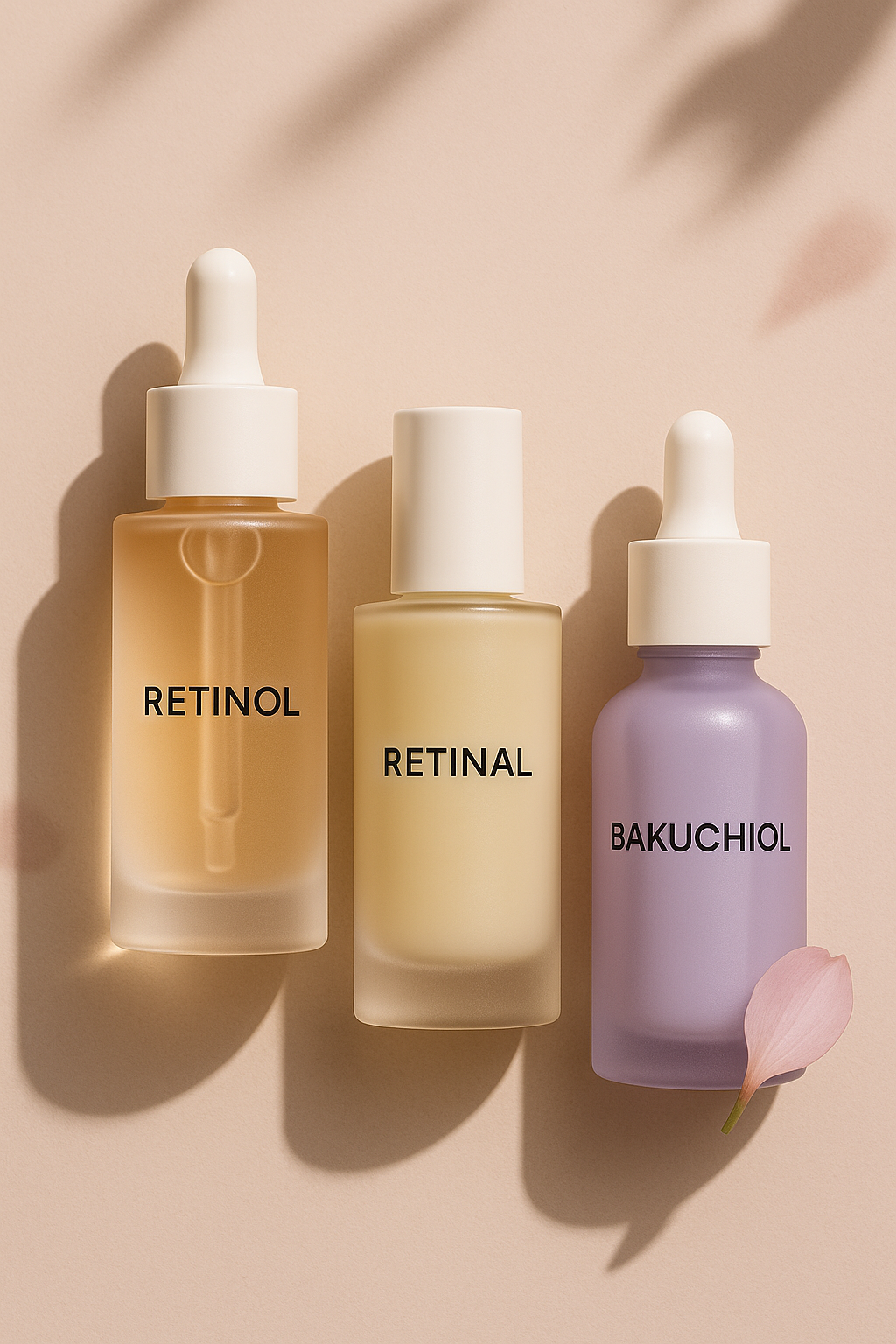
Retinol Rules Are Changing: What EU Limits Mean & Smart Alternatives
Share
Retinol has long been a go-to in skincare, valued for improving texture, refining pores, and supporting a youthful look. But from 2025, the EU is introducing new limits on retinol in over-the-counter cosmetics. These updates—often called the EU retinol limit 2025—are part of a wider effort to ensure consumer safety with long-term use.
So what does this mean for your serums and creams? And which alternatives can step in to keep your skincare routine effective? Let’s break it down and look at options like retinal and bakuchiol.
Why the EU Is Setting a Retinol Limit
The European Union reviews cosmetic ingredients regularly to balance benefits with long-term safety. Retinol (a form of vitamin A) is effective, but higher concentrations can:
- Increase skin sensitivity
- Cause irritation, dryness, or peeling in some users
- Add to total vitamin A exposure when combined with diet or supplements
To address these concerns, the EU has amended its Cosmetics Regulation (Annex III). The new limits set maximum concentrations of retinol (and other vitamin A forms) in cosmetics:
- 0.3% retinol equivalent (RE) in face and other leave-on products
- 0.05% RE in body lotions
Prescription-strength retinoids (regulated as medicines) are not affected, since this legislation only applies to cosmetics.
There are also transition deadlines:
- From 1 November 2025, no new non-compliant products may be placed on the EU market.
- By 1 May 2027, all existing non-compliant products must be withdrawn.
What This Means for Your Skincare Routine
If you’ve been using high-strength retinol products, you may notice some changes over the next few years:
- Lower concentrations – popular serums and creams will be reformulated to meet the new limits.
- Gentler formulations – products may feel less aggressive, reducing risk of irritation.
- Gradual results – improvements may be more subtle and take longer, depending on your skin.
- More choice in alternatives – many brands are turning to retinal (retinaldehyde) and bakuchiol to deliver results within the rules.
Retinol vs. Retinal vs. Bakuchiol
Retinol: The Classic
- Widely studied anti-aging ingredient
- Supports collagen production and skin renewal
- May cause dryness, redness, or peeling—especially at higher strengths
Retinal (Retinaldehyde): A More Efficient Alternative
- One metabolic step closer to retinoic acid (the active form used in prescription treatments)
- Can act more efficiently in some formulations compared to retinol
- Often considered gentler at lower doses, though results depend on concentration and skin type
- Growing interest in K-beauty and J-beauty for balancing performance with tolerability
Bakuchiol: The Plant-Based Option
- Derived from the babchi plant
- Studies suggest it can deliver similar benefits to retinol in some cases, with fewer reports of irritation
- More photostable than retinol, which means it can be used in the daytime—though SPF is still essential
- Frequently paired with hydrating and soothing ingredients in K-beauty formulations
How to Adapt Your Routine
Here are practical tips for adjusting your skincare to the new regulations:
- Try retinal or bakuchiol if you’re sensitive to retinol or want to explore future-proof options.
- Combine with hydration – serums with hyaluronic acid, niacinamide, or ceramides help reduce dryness.
- Alternate with Vitamin C – Vitamin C in the morning and vitamin A (or its alternatives) at night keeps your routine balanced.
- Always use SPF – whether with retinol, retinal, or bakuchiol, sun protection is non-negotiable.
- Check your labels – as reformulated products roll out, the ingredients list is the best way to know what you’re using.
Key Takeaways
- The EU retinol limit 2025 sets stricter concentration rules for cosmetics: 0.3% in facial products, 0.05% in body lotions.
- The change applies to over-the-counter skincare, not prescription treatments.
- By 2027, all products in the EU must comply.
- Alternatives like retinal and bakuchiol are becoming more common as gentler, innovative options.
- Supporting your skin with hydration and SPF remains just as important.
Conclusion
The EU retinol limit 2025 is an important step in balancing skincare results with consumer safety. While some favorite formulas may feel different, this shift opens the door to gentler innovations and plant-based alternatives.
With smart swaps like retinal and bakuchiol, plus consistent habits like hydration and sun protection, you can keep your skincare routine effective, safe, and future-ready.
Frequently Asked Questions about the EU Retinol Limit 2025
Can I still use my current retinol products?
Yes—for now, you can continue using the products you already own. The new rules apply to products placed on the EU market after 1 November 2025. By 1 May 2027, all non-compliant products must be withdrawn, so retailers and brands will reformulate before then.
Does the EU retinol limit apply to prescription creams?
No. The EU Cosmetics Regulation only applies to cosmetic products. Prescription-strength retinoids (such as tretinoin or adapalene) are regulated separately as medicines and are unaffected by this change.
Will retinol products become less effective after 2025?
Not necessarily. While concentrations will be capped, results often depend on formulation quality, supporting ingredients, and consistent use. Many brands are innovating to deliver strong results within the new limits.
Is bakuchiol really as effective as retinol?
Studies suggest bakuchiol can mimic some effects of retinol, such as improving skin texture and reducing fine lines, without the same risk of irritation. However, it may not work identically for everyone. It’s best seen as a gentle alternative, not a one-to-one replacement.
What’s the difference between retinol and retinal?
Retinal (retinaldehyde) is one metabolic step closer to retinoic acid, the active form your skin uses. This means it may work more efficiently in some cases while still being gentler than prescription retinoids. Many users find it a good middle ground.
Do I still need SPF if I switch to bakuchiol?
Yes! Even though bakuchiol is more stable in daylight compared to retinol, UV protection is always essential for healthy skin and to support any anti-aging routine.